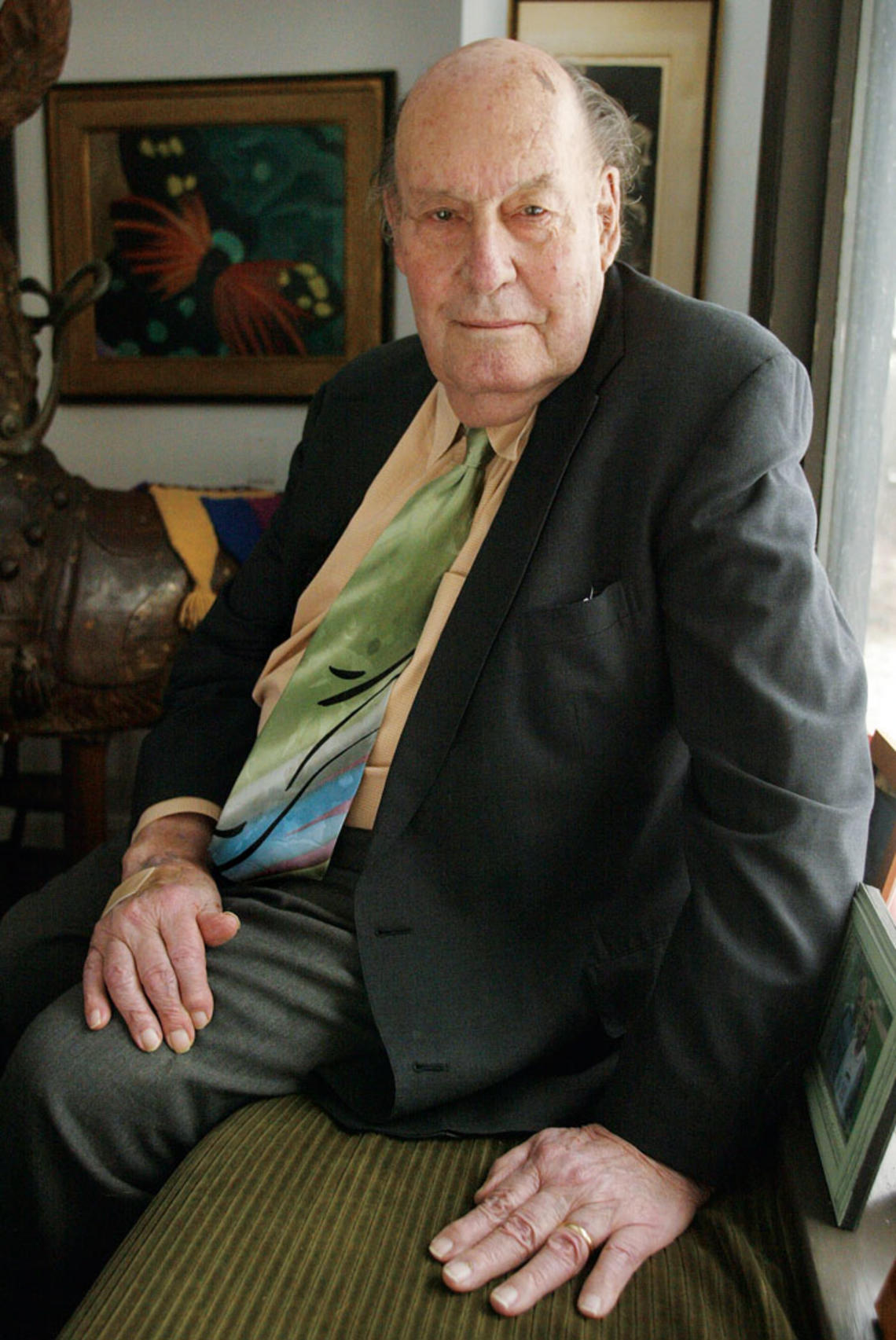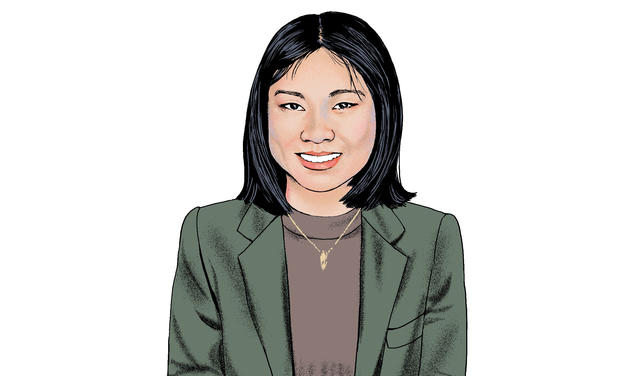
Nicholas Katzenbach ’43 was a key member of the Kennedy and Johnson administrations, serving as deputy attorney general, attorney general, and finally undersecretary of state. Katzenbach was not merely present for many of the watershed events of the turbulent 1960s — integration in the South, the aftermath of the assassination of President Kennedy, the Vietnam War — he also shaped them immeasurably, through his advice and counsel.
You were a prisoner of war for two years, in Italy and Germany. What was that like?
It was probably the most influential experience that I had. It was not pleasant, though we were really well treated throughout. At the end it got very rough because they didn’t have any food and we didn’t have any food. So things were difficult. But it was not because they were being mean. It was influential because you realized what it is not to be free, not to have liberty.
As a former POW, where do you stand on the question of torture and whether it’s acceptable?
It’s not acceptable. Of course it isn’t acceptable. The Geneva Convention was important as far as we were concerned. [Our captors] didn’t comply with the Geneva Convention in every respect. But they complied with it in general terms. We were never tortured or abused, even including questioning in Italy at a special camp. There were just questions. You refused to answer them, and you got away with it. They had the room bugged. We knew that because the guard at the door said, “I lived in Boston 17 years — there’s a bug in the ceiling.” He let us know.
Many people have commented on the famous “Stand in the Schoolhouse Door,” in which you confronted Gov. George Wallace over the integration of the University of Alabama. Was it an orchestrated confrontation, as it’s been described?
It was not [orchestrated] at all. That story comes from a very good reporter who later was editor of the [New York] Times, who was covering civil rights at the time. He confused two things. We went down there and made an initial stand in the schoolhouse door. And Wallace turned us down and said he wasn’t going to let the kids register. We stayed on the campus; I’d gotten the dorm keys. We put the state guard into national service, and Gen. [Henry] Graham was the state guard commander and a close friend of Wallace. He came to Gen. [Creighton] Abrams [then commander of the federal troops], who was with me, and said that Gov. Wallace wanted to stand in the door again and make a very short speech. And if we permitted that, he would go away and he would leave all the law enforcement people to be sure there were no problems. And I said, “That’s a good deal. As long as you don’t talk over two minutes, it’s OK with me.” That was the only orchestration.
That was the second time?
That’s right. The Times reporter asked me about it, and he confused the two. I said, ‘Well, we knew he [Wallace] was going to leave.’ Well, we did. But it was not a put-up job. Gov. Wallace had painted positions where we should stand. I got furious and I told Frank Rose, the president of the university, that I wanted them all removed, and he did remove most of them, though he didn’t get all of them quite wiped out. I was sufficiently annoyed. There was a line I was meant to stop at. I just didn’t stop.
Were you frightened?
I was scared to death. The only thing that scared me was I’d make a fool of myself. I wasn’t scared physically about anything. With all those television cameras, I couldn’t have felt safer. Bobby [Kennedy] said beforehand, “What are you going to say?” I said, “I don’t really know.” He said, “The president says he wants you to make Wallace look foolish.” I said, “Well, thanks a lot. How do I do that?” He said, “Oh, I don’t know. You’ll do just fine.”
You were deputy attorney general under Robert F. Kennedy when President Kennedy was assassinated. Where were you when you heard that news?
I’d just gone to lunch at a restaurant near the Justice Department with one of my assistants, Joe Dolan, who later worked for Bobby [Kennedy] as his administrative assistant. They had a radio on behind the lunch counter. Before we ordered, they said President Kennedy had been assassinated. They’d shot him. So Joe and I jumped up and left the restaurant and went back to the Justice Department, to Bobby’s office. Bobby was down at [his estate] Hickory Hill. ... I called Bobby. He said, “I just heard from [FBI head J. Edgar] Hoover that the president’s dead. I think Hoover enjoyed telling me.” And then about five minutes later, it was Bobby again. It was sort of appalling to me, in a way, that Johnson’s people were calling Bobby for advice as attorney general. He said, “He [Johnson] doesn’t have to be sworn in in Texas, does he?” I said no. Bobby just couldn’t stand the idea of his being sworn in in Texas. Actually I thought it was a pretty good idea — the faster they could do it was a good idea. I think the next call I got was from [Johnson friend and assistant] Jack Valenti, saying they wanted to swear the president in down there but they didn’t have a copy of the oath. What was the oath? It’s one of the two oaths in the Constitution of the United States! I thought they might have known that. ... So I dictated it over the phone to them.
Three days after President Kennedy’s death, you wrote a memo to Bill Moyers, who was working in the White House, urging the creation of what became the Warren Commission. That memo has proved to be catnip to conspiracy theorists, since it appears to argue for speed over thoroughness.
Badly written memo. It seems to me that the answer to those who think it was a whitewash is: How on earth could you appoint a commission like that and then shut them up? But there was so much potential for conspiracy around: Oswald’s visit to Russia, his Russian wife. ... And if you look back on Abe Lincoln’s assassination, right up to this day you have people talking about a conspiracy there. It’s not very satisfactory to have some nut shoot the president without having a conspiracy. My purpose was to try to gather all the evidence and get it out and tell people it’s going to be out. That was what I wrote that memo to try to say, and I didn’t say it very well.
Was J. Edgar Hoover’s decision to bug Martin Luther King Jr. the reason you stepped down as attorney general?
Not really. I think I was tired of it. Part of it was the bugs on King, which I don’t think Hoover was doing any more by then. I think we had that mare settled. More than that, with the war in Vietnam, Hoover was unleashed. He had investigators looking at every youth movement in the country. He was bringing cases for draft-card burning. Those were not cases I wanted. I didn’t get any kick out of them. I thought they were stupid cases.
But didn’t you have to deal with the same issues in your new job? As undersecretary you visited Vietnam on several occasions.
Yes, I did. I had a rather quixotic idea. I thought I could get rid of the Vietnam war. I didn’t see why we couldn’t get negotiations in Vietnam that would end that war there. It was probably just my own ignorance. I had gotten several civil rights bills through. I thought that was tougher than getting a peace in Vietnam. And that’s what Johnson said he wanted.
Do you feel as if the great accomplishments of the civil rights movement have been undone?
Not really. They’ve been slowed down from what they ought to be. But I don’t think we’ve gone backward. I don’t think anybody could turn them around. We could have done much better than we’ve done. But when you think about it, I don’t think some in the Congress and the people really appreciated the change [they were making] in the social life of this country. We’ve done well in terms of making a black middle class. Universities have been very helpful in this. In the [early] ’60s, you couldn’t have seen a black face on television. But the poor have not benefited, and there’s still a lot of bias. It’s rarely articulated, but it exists.
In 1998, at the request of the White House, you testified during the hearings on the Clinton impeachment. What did you think about the hearings?
It was absolutely silly. And it was silly for this reason, if no other: It was silly because I don’t think that the lie Clinton told had anything to do with being president; it had much more to do with being a husband. But even if you ignored that, nobody in the House or the Senate could conceivably have thought that Bill Clinton was going to be convicted. And why on earth do you go through that process if there’s no possibility of conviction?










0 Responses